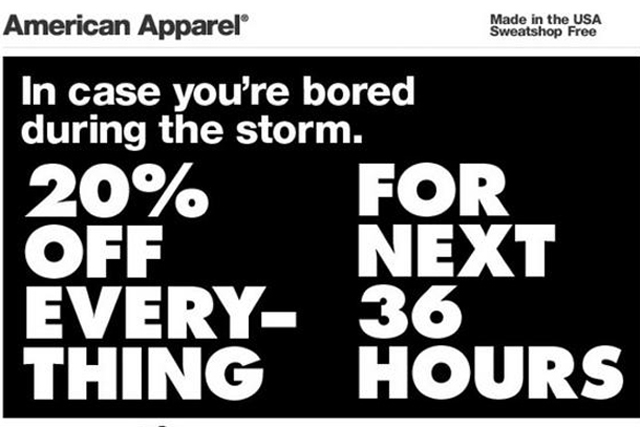
For many of the 6m Americans who woke up to darkness just over a week ago, their landscape will have irrevocably changed.
While economists are scrambling to count the financial cost of the deadly surge of Superstorm Sandy, some consumers will be coming to terms with unfathomable tragedy. At the time of writing, at least 70 deaths have been tied to the storm in the US, which has wreaked havoc on parts of the east coast and north-east of the country.
The New York Stock Exchange closed for two days, and Obama and Romney placed their campaigning for the Presidency on hold.
Why, then, did clothing retailer American Apparel feel that an email blast for a 'Hurricane Sandy Sale' offering consumers 20% off for the next 36 hours 'in case you're bored during the storm' was anything other than horrendously inappropriate.
Unfortunately, this was no lone example of the crassest and most insensitive type of marketing on display. Gap took to its Twitter account to declare: 'All impacted by #Sandy, stay safe! We'll be doing lots of Gap.com shopping today. How about you?'
In a similar vein, last year fashion designer Kenneth Cole's Twitter feed infamously made light of the democracy protests in Egypt, jokily tweeting: 'Millions are in uproar in #Cairo. Rumor is they heard our new spring collection is now available online.'
Real-time marketing, the 24-7 culture, marketing never stops; we have all read these cliches so often that they have almost become wallpaper to those in the industry.
Nonetheless, the creation of a culture in which a natural disaster is seen by some practitioners as primarily a marketing opportunity is, quite simply, frightening.
It is a well-worn adage that half of all art is knowing when to stop; brands faced with the very worst ravages of nature need to know when to - please - just shut up.
THE UPSHOT
What brands should know about knowing when to shut up
Be decent
It is tempting to start with the simple directive 'do not act like a moron' or engage in the kind of marketing that would make Malcolm Tucker blush; but it is about so much more. Brands cannot operate in a moral vacuum and marketers must never be afraid to voice their concerns about irresponsible activity.
You are not always part of the conversation
In the flurry to prove their social credentials many brands think they have the right to engage with anything. This mistaken belief has led Pizza Hut to attempt to co-opt a Presidential debate and American Apparel to view Sandy as a sales vehicle.
Beware the marketing fishbowl
A hurricane is not a marketing opportunity; nor can it be diminished to a marketing lesson. Marketers need to look beyond their brand and their industry and maintain a broader perspective on the world.
Kindness matters
Amid the slash-and-burn mentality of the recession, businesses must beware of fostering toxic cultures. A relentless focus on sales above all other considerations can be corrosive.
Nicola Kemp is Marketing's head of features. Follow her on Twitter: @nickykc.



.jpg)
.jpeg)
